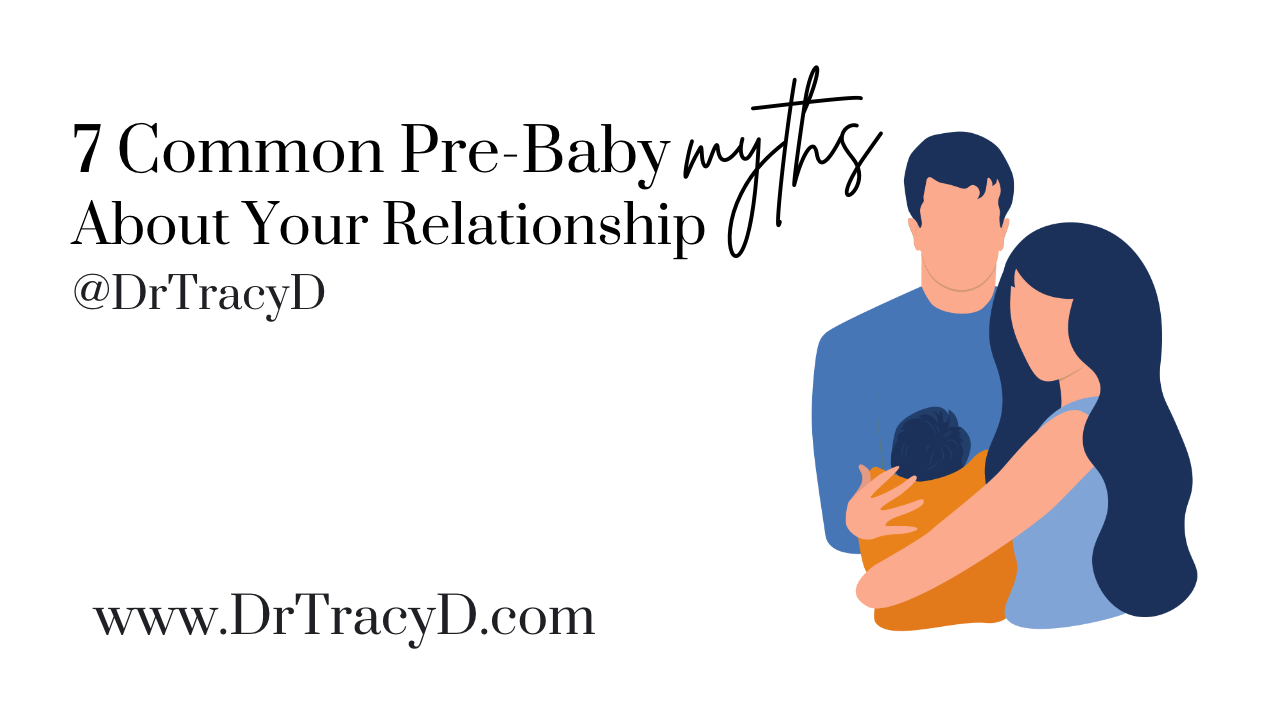7 Common Pre-Baby Myths About Your Relationship

Western culture tends to romanticize most experiences surrounding family— be it Pinterest-worthy weddings, Instagrammable holiday traditions, or sleepy newborn pictures. Especially when it comes to children, we expect our experiences to match the glossy photos or blissful captions that permeate our feeds. Furthermore, we can't help but make assumptions about how we'll react to parenthood based on what we've observed around us.
Here’s what I want you to know: It’s normal that your current reality doesn’t match the expectation that you had. You aren’t failing, nor is your relationship a failure just because adjusting to parenthood isn’t easy. So let’s toss the comparisons and self-criticisms and invite more love and kindness to the struggle that you are currently experiencing.
As you read through these pre-baby relationship myths vs. reality, keep in mind that there are resources to help you create a partnership that thrives after children. Don't forget to check out my Be Connected membership, or sign up for 28 Days of Love to bring your romantic love back into focus.
- Myth: We will feel close and more complete after having a baby
Reality: Research shows that 67% of parents experience a significant decline in their relationship satisfaction after having a baby. This is particularly true for the first three years of your baby's life.
While having a child is difficult, I want to point out that it doesn't mean you can't find ways to feel close and connected. Remember, two opposing truths can exist: You can love each other AND you can experience hard stuff. The hard does not mean that the love is not still present.
- Myth: We will both know the signs for PPD
Reality: Unfortunately, many people miss the signs of perinatal mood and anxiety disorders. If you are pregnant, spend some time now looking up the signs and symptoms of PPD. Know that 1 in 10 fathers are at risk for developing depression after having a baby, as well. For more support, please reach out for help from Postpartum Support International. - Myth: Everything will be 50/50
Reality: We show up with our own experiences from our families and internalized beliefs about what each parent’s role should be. Without discussing anything, our expectations and wishes are often left unmet.
It’s important to remember that in any relationship, it will never be 50/50. I like to remind people that relationships need to feel fair, not equal.
- Myth: We will still be romantic without trying
Reality: I have yet to meet a couple who says, "We don't have to put any effort into our relationship." Your relationship is like a growing flower: neglecting it and failing to water it will lead to eventual wilting. All relationships require effort toward nurture and growth. The amount of effort might change in different seasons– and the season of babies might call for more intentional care than when it was just the two of you.
- Myth: We will be different from other couples who struggled
Reality: Just because you are struggling doesn't mean that there is anything wrong with you. You are human. To be human means to experience pain and difficulties. I like to lean into compassion when we compare ourselves to others.
Here is a compassionate statement to try: It makes sense that we are struggling. This is a hard time, and we are not alone in this struggle. We are learning to be gentle and kind to ourselves and each other during such a big life transition.
- Myth: His excitement will match mine
Reality: Many of us grow up with the belief that if others have the same experience, reactions, or feelings about something, then it means that our feelings are valid. This desire for “sameness” is actually a near enemy of compassion. When we look to others to match our internal experience, we are not practicing an important relationship skill: differentiation. Differentiation says, "I have my own thoughts and feelings. You have your own thoughts and feelings. We are both okay." Your partner's excitement level doesn't invalidate your own. - Myth: My relationship with family members outside of our marriage will stay strong
Reality: Family members also have expectations of what it means to welcome a new baby into the fold. Often, these expectations are not vocalized, which may breed disappointment, unmet needs, and resentment for all parties. It is helpful to identify, then vocalize, your needs and wishes with family members–as well as listen to some of theirs– to work towards being on the same page.
Having a baby is a special time for a couple and it is an incredibly life-changing experience. Change isn’t usually easy. Communicating as a team with your partner and loved ones is important in order for you to walk in harmony through this often rewarding, yet difficult time.
Warmly,
Dr. Tracy




